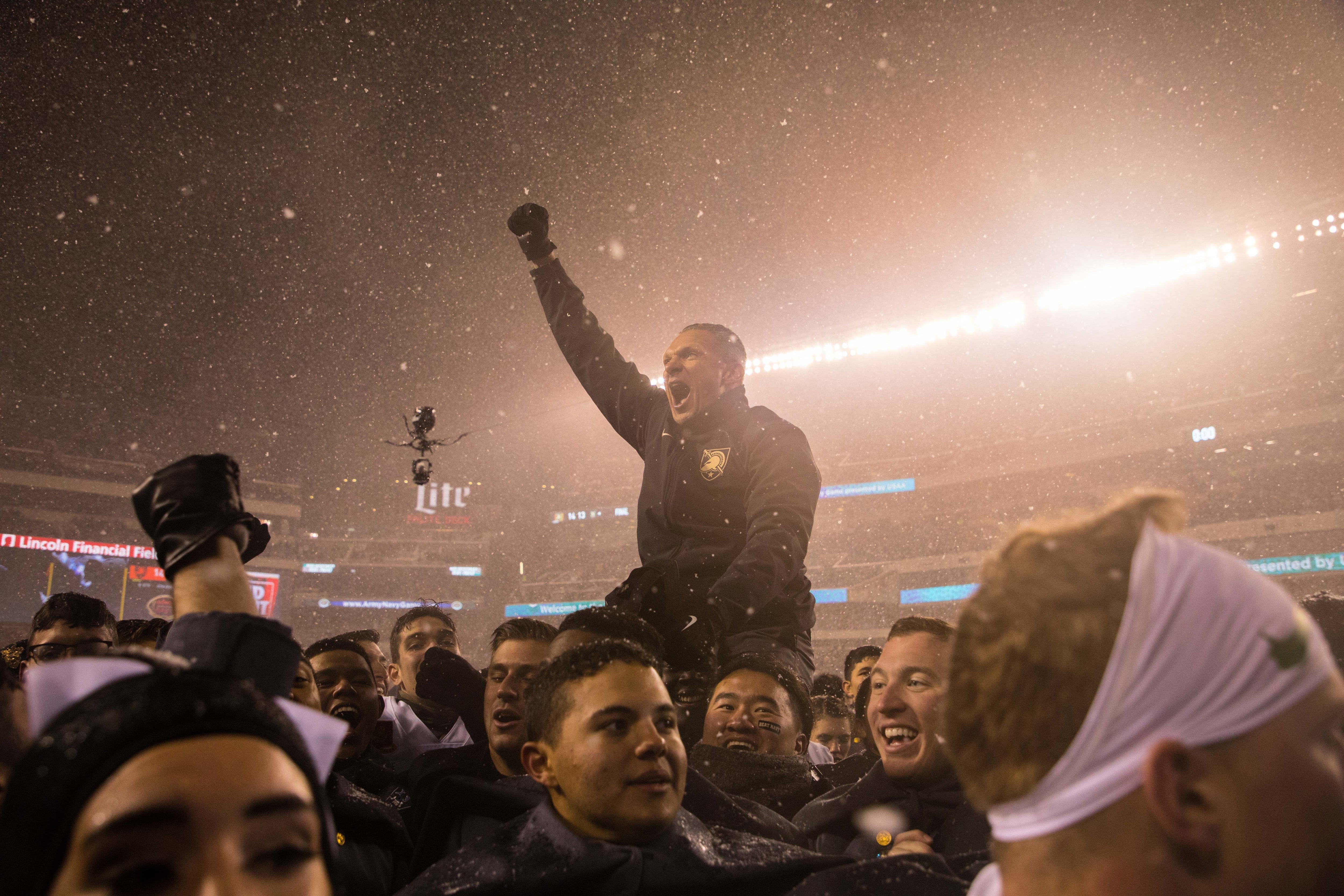When the U.S. Military Academy at West Point hired Jeff Monken as its 37th head football coach in 2013, the then-Georgia Southern coach was a bit of an unknown, having spent only four years as a head coach.
The few data points he had were promising. Before coming to West Point, he led Southern’s transition from the lower-level Football Championship Subdivision to the top-flight Football Bowl Subdivision. Along the way, he secured a massive upset over the Florida Gators in 2013. He also spent two decades as an assistant coach under triple option guru Paul Johnson at Navy and Georgia Tech.
The triple-option offense is a play strategy that uses three players who could run the ball via a toss, pitch or a quarterback keeping the ball and running or passing.
And at the time, the Army program was reeling. It was in the depths of a 14-year losing streak against arch-rival Navy, and the Black Knights had only posted one winning season since 1996.
West Point administrators argued that Monken was the right man for the job, citing his familiarity with the traditional option offense, and his understanding of the constraints that service academies face with recruiting.
Nine seasons and five bowl games later, their calculus appears correct. Although the cadets will likely miss a bowl game in 2022 unless they win this year’s edition of the Army-Navy rivalry, it’s worth asking: is Jeff Monken the best modern-era Army football coach?
Over more than 130 years of football, only one man has coached West Point to more wins — legendary head coach Red Blaik, who won 164 games and two national championships in his 18 years at the helm from 1941 to 1958.
And few coaches have seen similar success against arch-rival Navy, especially should Monken’s team prevail on Dec. 10.
In his nine seasons, Monken has also led the program to three Commander-in-Chief’s trophies, which go annually to the service academy with the best overall record against the service academies. Army had only won the trophy six times in the 40 seasons before he took the reins as head coach.
His success goes beyond just numbers, too, offering many memorable moments for the Long Gray Line.
The cadets stormed the field at Baltimore’s M&T Bank Stadium in 2016 after an Ahmad Bradshaw fourth-quarter touchdown run helped Monken’s team break the 14-year losing streak against the midshipmen.
Monken also oversaw back-to-back 10+ win seasons in 2017 and 2018. The latter year culminated in a 70-14 blowout of Houston in the Armed Forces Bowl to secure an 11-2 record and a final ranking at #19 in the Associated Press poll. That was the school’s first-ever 11-win season and only its second (and highest) appearance in the final AP poll of the year since 1958.
Army’s 2018 exploits saw Monken receive multiple national coach of the year awards, including the Maxwell Club’s George Munger Award.
And last year, kicker Cole Talley made a 41-yard field goal as time expired against Southeastern Conference foe the University of Missouri in the Armed Forces Bowl to lift the Black Knights to a 24-22 victory.
Thanks to the program’s remarkable turnaround, Monken’s name has surfaced in association with several coaching searches for big-name football programs. He was most recently considered a finalist for Nebraska’s now-filled vacancy, and other programs have approached him in recent years. Georgia Tech, where Monken once was an assistant, is also currently searching for its next head coach.
But that doesn’t mean he’s leaving anytime soon. After Kansas interviewed him for their head coaching job, Monken told the Middletown Times Herald-Record last year that he has, “a great job here. I work for great people.”
Editor’s notes: The author of this article, Davis Winkie, received a football scholarship offer from Monken’s staff at West Point in 2014. He did not attend West Point, instead electing to continue his football career at Vanderbilt University. Data analyzed for this article was downloaded from Sports-Reference.com.
Davis Winkie covers the Army for Military Times. He studied history at Vanderbilt and UNC-Chapel Hill, and served five years in the Army Guard. His investigations earned the Society of Professional Journalists' 2023 Sunshine Award and consecutive Military Reporters and Editors honors, among others. Davis was also a 2022 Livingston Awards finalist.




